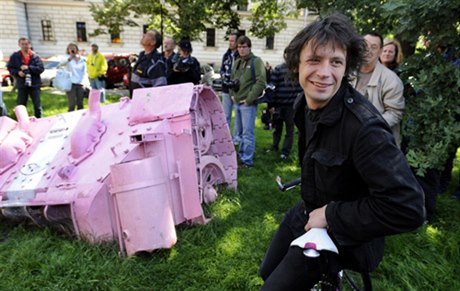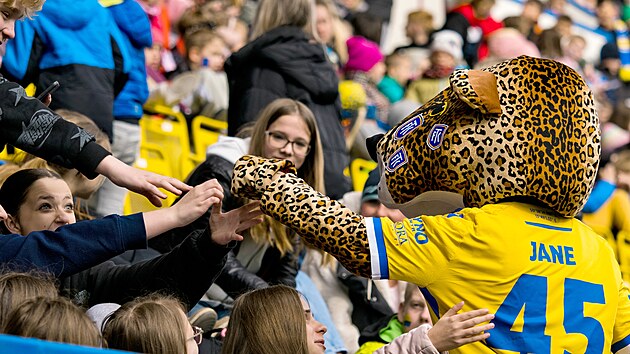The controversial Czech artist David Černý has apologized to former National Gallery director Milan Knížák — albeit in a statement that itself appears to be mocking and insincere — for having called him an “arrogant cripple dick” during an interview for a documentary that aired on Czech Television (ČT) early last year.
“My comparing Professor Milan Knížák to a male sexual organ using a vulgarity was inadequate. I apologize for the comparison with that organ,” Černý was quoted as saying on Monday by the ČTK news agency, adding that he was prepared to send the same message to Knížák in writing as a formal apology.
Černý’s disparaging comment about Knížák, who is also an artist, made its way into a documentary about the Jindřich Chalupecký art prize that aired last January; in September, after learning Knížák had launched litigation against him and the TV station, the artist had said he was surprised the makers of the documentary had not edited out his insult.
Knížák is suing the artist Kč 150,000 for having infringed his rights to honor and dignity, and is demanding Kč 500,000 from the Czech public broadcaster for having aired the Černý’s comment.
Černý issued the statement of apology on Monday after the judge presiding over the case, Veronika Křesťanová, on Monday called upon him and Knížák to settle their dispute out of court, adding that the former National Gallery director deserves an an apology.
At the same time, she said it is “necessary to view the comment in context,” saying the documentary attracted a small, specialized audience. This observation suggests that she is not inclined to impose financial damages against Černý.
Meanwhile, the Czech public broadcaster has published a written apology to Knížák on its website, and said its lawyers are seeking to reach an out-of-court settlement.
Artistic differences
This is hardly the first time the two artists have clashed publicly, and past events underscore the likelihood that Černý’s apology is insincere.
Back in 2000, Černý was awarded the Jindřich Chalupecký art prize — but refused to collect it as long as Knížák was director of the National Gallery. Eventually, the former president Václav Havel passed Černý the award on the street outside the National Gallery’s modern art building in Prague 7. Knížák responded by removing Černý’s works from display in the National Gallery. It was in relation to this incident that Černý made the insult about Knížák in the documentary.
In 2003, Černý erected two large statues of naked people that could accessed through their rectums by climbing up a ladder. Those who peered inside were treated to a video of two figures representing Knížák and the Czech president, Václav Klaus, feeding each other porridge to the soundtrack of “We are the Champions” by the British rock group Queen.
Černý established his reputation as a provocative artist when shortly after the so-called Velvet Revolution in 1989 he painted pink a Soviet tank which stood on a pedestal on a square in central Prague as a memorial to the soldiers killed during the Soviet-led invasion of Czechoslovakia in 1968.
More recently, Černý grabbed attention with a large installation named Entropa and displayed in front of the EU’s Justus Lipsius building in Brussels in 2009. The piece, financed by the Czech government as part of the country’s presidency of the EU, was supposedly created by artists from each of the union’s member states and depicted each EU country in the light of a stereotype or recent socio-political developments. It later transpired that Černý created the whole work alone.
Knížák, a prominent dissident under the communist regime in Czechoslovakia, was director of the National Gallery from 1999 through to 2011, when he was replaced by Vladimír Rösel.
The next court hearing of Knížák’s case against Černý is scheduled for February 13.




